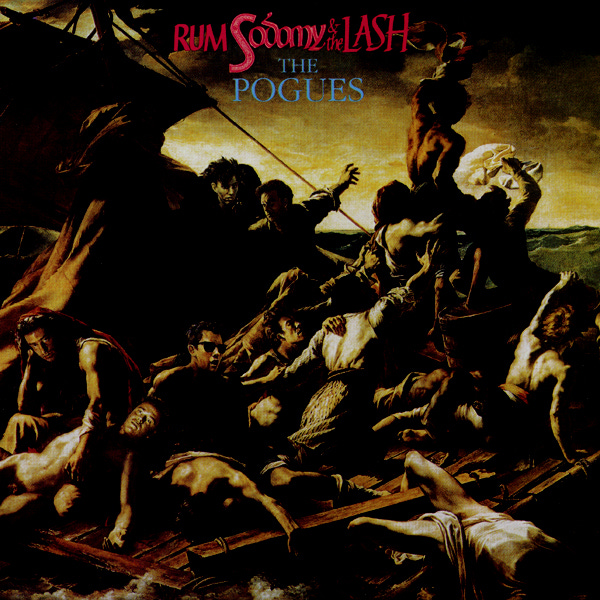And I ask myself the same question
The Pogues - 'And The Band Played Waltzing Matilda' (Rum, Sodomy & The Lash - 1985)
‘And The Band Played Waltzing Matilda’, the closing track of The Pogues’ 1985 album Rum, Sodomy & the Lash, is a profoundly moving and thought-provoking song that delves into the grim realities of war.
Penned initially by Australian singer-songwriter Eric Bogle in 1971, Bogle's original version of the song was a searing critique of war, specifically focusing on the Gallipoli campaign during World War I. It is one of the most potent anti-war songs ever written and an understated but blistering attack on the futility and waste of war
The Gallipoli campaign was a disastrous and bloody conflict in 1915 on the Gallipoli peninsula in modern-day Turkey. It was fought between the forces of the British Empire and France against the Ottoman Empire. The campaign is mainly remembered in Australia and New Zealand due to the significant losses suffered by the Australian and New Zealand Army Corps (ANZAC).
Through poignant lyrics, Bogle painted a vivid picture of the horrors endured by soldiers, emphasising the senseless slaughter and the toll it took on the protagonist. His song struck a chord with audiences, resonating deeply with its raw emotion and powerful storytelling.
When The Pogues took on the task of covering ‘And The Band Played Waltzing Matilda’ for Rum Sodomy & the Lash, they brought their unique musical style to the table. The band, known for their energetic fusion of traditional Irish folk music and punk rock, added a new dimension to the song. Conventional Irish instruments like the tin whistle, accordion, and fiddle infused the track with authentic and dynamic quality, enhancing its impact.
Rum Sodomy & the Lash exemplified The Pogues' musical prowess and ability to engage with weighty themes. Released as their second studio album, it solidified their reputation as boundary-pushing artists who fearlessly blended genres.
Within the album, ‘And The Band Played Waltzing Matilda’ stands out as a haunting and powerful track – It is almost twice the length of anything else and the only song that doesn’t originate from the band, the UK or Ireland. The Pogues' rendition honoured the essence of Bogle's original while adding their distinct style and passion. Shane MacGowan's gritty vocals and the band's energetic instrumentation intensified the song's emotional impact, transporting listeners to the bleak landscapes of war.
It is a measure of the Pogues' unique appeal that they could take a song by a contemporary folk singer like Eric Bogle and, without changing a word, make it sound like a centuries-old lament dredged up from the collective unconscious of the dispossessed.
The last section of the song portrays the tragic reality of how injured soldiers were often treated as disposable tools rather than human beings. Words like "shipped" emphasise the dehumanising nature of their treatment, further highlighting the unprecedented horror of World War I. The song reminds us of the immense sacrifices made by these individuals and raises questions about the value placed on human life during times of conflict.
‘And The Band Played Waltzing Matilda’ references "Shellshock," the term used during that era to describe what is now known as PTSD. Initially dismissed as a minor issue, it became a significant problem requiring proper treatment. This acknowledgement sheds light on soldiers’ mental scars, reminding us of the lasting psychological impact of war long after the physical wounds have healed.
Australian civilians, like many others affected by war, were often caught off guard by the actual realities faced by soldiers. War propaganda had presented the conflict as heroic and valiant, obscuring the physical and psychological toll it exacted. The song serves as a wake-up call, challenging the romanticised narratives of war and urging listeners to confront the harsh truths behind the heroic veneer.
April 25th holds immense importance in Australia as ANZAC Day, a national public holiday commemorating the men and women who have served the country. The day is marked by parades, allowing veterans to be honoured and remembered. However, the younger generation may feel distant from the conflict and need help to grasp the significance of the commemorations. The song prompts us to reflect on the importance of remembering and understanding the sacrifices made by those who came before us.
The song’s narrator is haunted by traumatic memories and questions the worthiness of commemorating such a horrific event. In contemplating the dwindling number of Gallipoli veterans and their role as living testaments against the folly and destruction of war, the narrator reminds us of the importance of learning from history and avoiding repeating past mistakes.
The closing lyrics, adapted from the ‘Waltzing Matilda’ chorus, evoke a poignant loss and loneliness. The narrator reflects on the many friends lost in war or due to their injuries, leaving them with few companions remaining. This melancholy tone serves as a reminder of the profound human cost of conflict and its lasting impact on individuals and communities.





Love this song, but I think the original is even better, I used it on a post/playlist of my favourite WW1 referencing songs, as attached
https://challenge69.substack.com/p/all-together-now